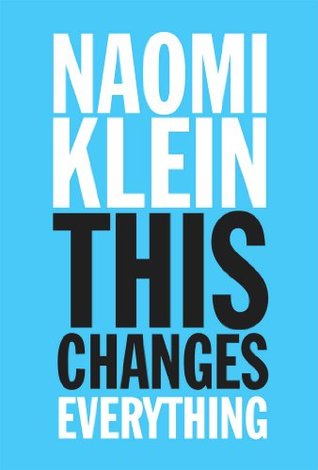More on this book
Community
Kindle Notes & Highlights
by
Naomi Klein
Read between
December 27, 2017 - February 2, 2018
since the climate is changing as a result of two-hundred-odd years of such accumulated emissions, that means that the countries that have been powering their economies with fossil fuels since the Industrial Revolution have done far more to cause temperatures to rise than those that just got in on the globalization game in the last couple of decades.
Developed countries, which represent less than 20 percent of the world’s population, have emitted almost 70 percent of all the greenhouse gas pollution that is now destabilizing the climate. (The United States alone, which comprises less than 5 percent of the global population, now contributes about 14 percent of all carbon emissions.)
everyone is responsible for being part of the climate solution but the countries that have emitted more over the past century should be the first to cut and should also help finance poorer countries to switch to clean development models.
the broader failure of the international climate negotiations, which have stalled again and again over the central question of whether climate action will reflect the history of who created the crisis. The end result: emissions keep soaring way past safe levels, everyone loses, the poorest lose first and worst.
the most powerful lever for change in the Global South is the same as in the Global North: the emergence of positive, practical, and concrete alternatives to dirty development that do not ask people to choose between higher living standards and toxic extraction.
the solution is not for the wealthy world to contract its economies while allowing the developing world to pollute its way to prosperity (even if this were possible). It is for developing countries to “develop differently. We do not want to first pollute and then clean up. So we need money, we need technology, to be able to do things differently.”43 And that means the wealthy world must pay its climate debts.
“Your wealth today has a relationship with the way society has drawn on nature, and overdrawn on nature. That has to be paid back. That’s the historical responsibility issues that we need to confront.”
wealthy countries do not just need to help the Global South move to a low-emissions economic path because it’s the right thing to do. We need to do it because our collective survival depends on it.
each country’s fair share of the global carbon-cutting burden is determined by two key factors: responsibility for historical emissions and capacity to contribute, based on the country’s level of development.
there are, in the immediate term, plenty of affordable ways for Northern countries to begin to honor our climate debts without going broke—from erasing the foreign debts currently owed by developing countries in exchange for climate action to loosening green energy patents and transferring the associated technological know-how.
much of the cost does not need to come from regular taxpayers; it can and should come from the corporations most responsible for driving this crisis.
What we cannot expect is that the people least responsible for this crisis will foot all, or even most, of the bill.
there is simply no credible way forward that does not involve redressing the real roots of poverty.
A worldview based on regeneration and renewal rather than domination and depletion.
For all the talk about the right to life and the rights of the unborn, our culture pays precious little attention to the particular vulnerabilities of children, let alone developing life.
In species after species, climate change is creating pressures that are depriving life-forms of their most essential survival tool: the ability to create new life and carry on their genetic lines.
“What if it’s a big hoax and we create a better world for nothing?”
surviving is not the same as thriving, not the same as living well.
only mass social movements can save us now. Because we know where the current system, left unchecked, is headed.
lowering global emissions in line with climate scientists’ urgent warnings demands changes of a truly daunting speed and scale.
the need for a redistribution of wealth. Humanity will have to address this question, no matter how devastating the consequences may be.”
what is overwhelming about the climate challenge is that it requires breaking so many rules at once—rules written into national laws and trade agreements, as well as powerful unwritten rules that tell us that no government can increase taxes and stay in power, or say no to major investments no matter how damaging, or plan to gradually contract those parts of our economies that endanger us all.
So how do you change a worldview, an unquestioned ideology? Part of it involves choosing the right early policy battles—game-changing ones that don’t merely aim to change laws but change patterns of thought.
a full-throated debate about values—about what we owe to one another based on our shared humanity, and what it is that we collectively value more than economic growth and corporate profits.
a great deal of the work of deep social change involves having debates during which new stories can be told to replace the ones that have failed us.
abolitionists understood that their role was not merely to ban an abhorrent practice but to try to change the deeply entrenched values that had made slavery acceptable in the first place.
it is more cost-effective to invest in emission reduction now than disaster response later.
“What’s politically realistic today may have very little to do with what’s politically realistic after another few Hurricane Katrinas and another few Superstorm Sandys and another few Typhoon Bophas hit us.”
It is slowly dawning on a great many of us that no one is going to step in and fix this crisis; that if change is to take place it will only be because leadership bubbled up from below.


